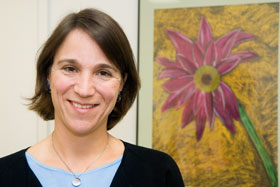  |
| HOME | THIS ISSUE | CALENDAR | GRANTS | BACK ISSUES | < BACK | NEXT > |
Researcher finds terrible-twos not always ‘just a phase’by Jane Shaskan - October 16, 2006 |
||||
| Understanding the clinical significance of social and emotional behavioral problems in early childhood is the goal of Health Center researcher Margaret Briggs-Gowan. "Rapid developmental change takes place from birth to age three," says Briggs-Gowan, an assistant professor in the Department of Psychiatry.
"Many parents and professionals believe that early social-emotional and behavioral problems, like the terrible-twos, will diminish as the child grows older. But evidence is showing that some of these problems can persist, and that these young children can benefit from intervention." In 1998, Briggs-Gowan, and collaborator Alice Carter at the University of Massachusetts-Boston, randomly contacted parents in the Greater New Haven area and asked them to complete an Infant-Toddler Social and Emotional Assessment, a questionnaire the researchers had developed to measure and compare toddlers' social and emotional development and behavior. With information from more than 1,200 parents, Briggs-Gowan found that about one in 10 children had a high level of problem behaviors, such as over-activity, aggression, frequent tantrums, sleep problems, feeding problems, fears, and anxieties that lasted for one year or more. "These kinds of problems can be very challenging and worrisome for parents and may eventually interfere with the child's elementary school experience," she says. "By showing professionals and parents that some early problems don't go away, we can help them work together to determine if intervention is needed." In the survey, parents answered questions about abilities that develop in early childhood, such as toddlers' awareness of others' feelings, trying to make other children feel better, sharing and playing cooperatively, and trying to follow rules. Briggs-Gowan's findings show that early social and emotional skills are important. Children who have them in early childhood have better social skills in elementary school, according to their kindergarten teachers, who completed a brief survey about children's behavior and development. "What we're finding is that early social-emotional skills are the foundation for successful social skills in early elementary school," she says. "Identifying potential problems early is the first step to solving them." The questionnaires were developed primarily to help pediatricians, early intervention providers, and early childhood teachers measure children's social and emotional skills and behavior, Briggs- Gowan says. Parents who took part in the project provided the critical information that helped determine which questions provided the most useful and important information. Briggs-Gowan says the survey demonstrated that "a pattern of troubling behaviors - tantrums, fears, anxieties, disobedience, sleep issues - the more the worse. Were parents feeling stressed? What types of challenges did families face? These are just some of the issues we asked about in our survey." The two questionnaires have since been published and are currently used by professionals worldwide. "Parents need to be aware that the terrible-twos may not be just a phase, but an indicator for problems that can last perhaps into elementary school," says Briggs- Gowan. "Physicians need to take parental complaints about behavior seriously. For most toddlers the terrible-twos pass, but not for all." The study was funded by the National Institute of Mental Health. The findings were published in the Journal of the American Academy of Child Adolescent Psychiatry in July.
|
| ADVANCE HOME UCONN HOME |

